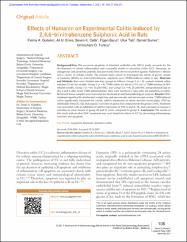Effects of Humanin on Experimental Colitis Induced by 2,4,6-trinitrobenzene Sulphonic Acid in Rats

View/
Date
2017Author
Gültekin, Fatma A.Emre, Ali U.
Çelik, Sevim K.
Barut, Figen
Tali, Ufuk
Sümer, Demet
Özel Türkcü, Ümmühani
Metadata
Show full item recordAbstract
Background/Aim: The excessive apoptosis of intestinal epithelial cells (IECs) partly accounts for the development of colonic inflammation and eventually results in ulcerative colitis (UC). Humanin, an endogenous anti-apoptotic peptide, has previously been shown to protect against Alzheimer's disease and a variety of cellular insults. The present study aimed to investigate the effects of glysin variant of humanin (HNG) on 2,4,6-trinitrobenzene sulphonic acid (TNBS)-induced colitis in rats. Materials and Methods: Rats were divided into four groups as follows: Group 1 (n = 8): control; isotonic saline solution 0.1 ml/rat rectally, Group 2 (n = 8): TNBS colitis; 0.1 ml of a 2.5% (w/v) TNBS solution in 50% ethanol rectally, Group 3 (n = 8): 10 mu M HNG, and Group 4 (n = 8): 20 mu M HNG intraperitoneal (ip) on day 2 and 6 after rectal TNBS administration. Rats were sacrificed 7 days after the induction of colitis. Blood and tissue samples were harvested for biochemical and histopathological analysis. Results: HNG treatment significantly ameliorated weight loss and macroscopic and microscopic scores. TNBS-induced colitis significantly increased the colonic mRNA expression of tumor necrosis factor-alpha (TNF-alpha), interleukin-1beta (IL-1 beta), and caspase-3 activities in group II in comparison to the group I. HNG treatment was associated with an inhibition of mRNA expression of TNF-alpha and IL-1 beta, and a decrease in caspase-3 activities in colon tissues in group III and IV when compared to group II. Conclusion: The results of this study indicate that HNG treatment may exert beneficial effects in UC by decreasing inflammatory reactions and apoptosis.

















